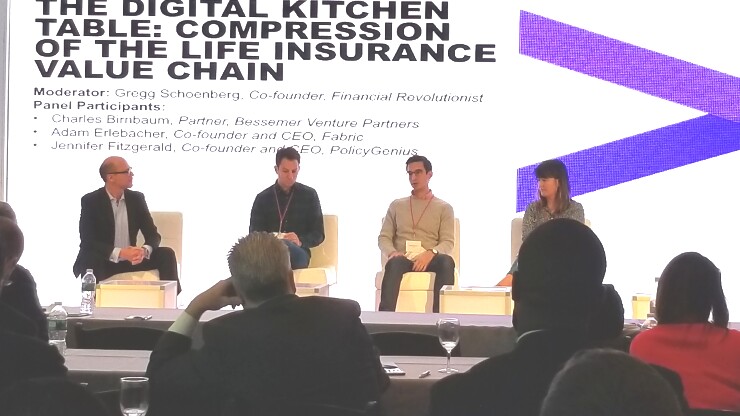While industry incumbents have brought every imaginable life insurance product to market, there is still room for startups to upend out-of-date distribution channels. That was the consensus of a panel discussion at Accenture’s Life Insurtech Summit in New York.
“Whoever can crack those problems can work with distributors the best,” said Charles Birnbaum, a partner at Bessemer Venture Partners, which sports a substantial
The forum, offering Birnbaum as the venture capital perspective, also featured the CEOs & Co-founders of insurtechs Fabric and PolicyGenius, Adam Erlebacher and Jennifer Fitzgerald.

Fabric’s goal is to make life insurance an impulse buy, its leader says. About 70% of its customers purchase life policies on the company’s website within 10 minutes of their first visit, Erlebacher adds. The startup searched for months to find a carrier partner to underwrite risk before it inked an agreement with Vantis Life Insurance Company, a subsidiary of Penn Mutual, in March. Fabric was looking for a carrier that “would work with more than just affluent customers, had a new tech stack and was not dependent on a huge agent network,” Erlebacher added.
Also see:
Panelists also noted that insurance companies are transitioning from an “A-to-B” distribution model, where agents own the relationships, to one where carriers trust non-traditional outside parties to issue policies and communicate with clients.
As an example, PolicyGenius has 16 life carrier partners. Of those, only four have direct-to-consumer distribution channels, and largely rely on agents, according to Fitzgerald. She says there is no sense of turmoil between her staff and agent partners of insurance clients.
“They tend to focus more on the annuities market, and less on the bread-and-butter life insurance and disability that we do,” she added.
Finally, panelists agreed that, despite the hype, chatbots are not necessarily the best way to communicate with customers at the point of sale or bundling of services.
“At its best, chatbots work well because it’s a flexible interaction. You can ask it a question and change topics without a problem,” said Erlebacher. “We find online forms are better because they allow customers to select changes to policies that they want.
Meanwhile, PolicyGenius largely relies on the human touch to close sales.
“Chat is underused as a sales channel,” says Fitzgerald. “In the moment you decide to apply for a life policy or skip it, there is no better resource than a phone number or human on chat.”





